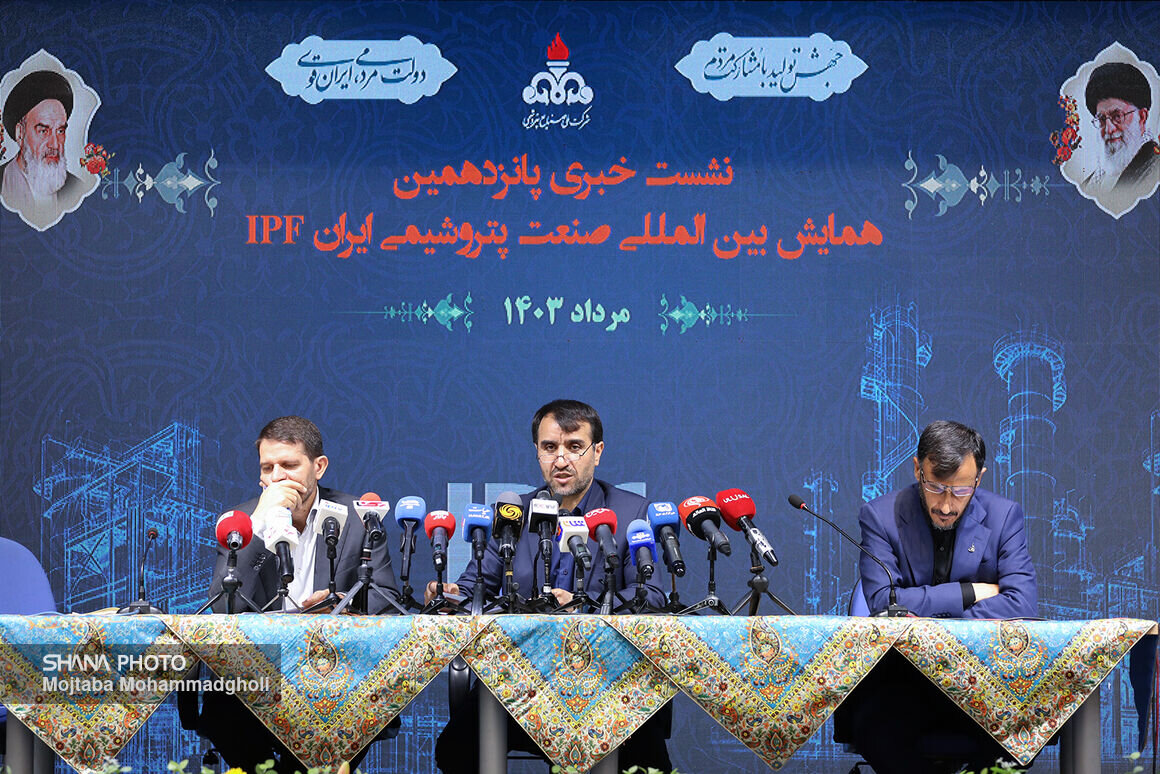‘IPF to improve Iran’s petchem industry status in world’

TEHRAN- Head of Iran’s National Petrochemical Company (NPC) Morteza Shahmirzaei said the achievements and latest developments of Iran’s petrochemical industry are tried to be presented in the 15th Iran Petrochemical Forum (IPF) to improve the position of this industry in the world.
Making the remarks in a press conference at the place of the company on Tuesday, the official said the 15th edition of this event will be held on August 4 and 5 with the presence of experts, scientists, inventors, domestic and foreign politicians and some foreign diplomats.
He mentioned presenting the achievements of the four continents of the world in the petrochemical industry, improving processes, identifying environmental pollution and avoiding their release in this industry, meaningful cooperation and strengthening of the petrochemical industry and financial institutions, commercial companies and manufacturers, unveiling advanced processes and sharing technological plans and ideas as some of the goals of holding this conference.
The 15th Iran Petrochemical Forum (IPF) will be held at the IRIB Conference Hall.
According to Shahmirzaei, almost all of the need for petrochemical catalysts in the country is met by domestic producers, and the company is taking final steps to fully indigenize the knowledge for the production of such catalysts.
He has said that the NPC is seriously pursuing the plan for localizing petrochemical industry catalysts.
He further said Iran’s petrochemical industry is moving on the way of progress and growth by relying on its capable infrastructures.
Referring to the government’s strategy of relying on sea-oriented development, Shahmirzaei has said that the petrochemical industry is being expanded across the shores of the Persian Gulf and Sea of Oman which will result in diversity in the basket of petrochemical products, economic growth and employment in the area.
Elsewhere in his remarks he said that “we should be determined to move toward providing our needs from within by relying on domestic capabilities, cutting the country’s dependency to foreign-made products.”
He announced that about 550 grades of petrochemical products are being produced inside the country at the moment which by making new investments, the capacity to produce different petrochemical products will grow; consequently, not only will meet domestic needs but increase the potential for exports as well.
In late May, Shahmirzaei said that over 97 petrochemical facilities are operating across Iran.
The official referred to the growth in Iran’s petrochemical industry, adding that there were only 6 petrochemical complexes in the country when the 1979 Islamic Revolution toppled former Shah and the Islamic Republic was founded 45 years ago.
Noting that the country produces some 550 different types of petrochemical products, he said that each one of these products helps the development of a part of the Iranian industry.
He expected that Iran’s petrochemical output will reach 100 million metric tons (mt) by the end of the current calendar year to March 2025.
Shahmirzaei had earlier said NPC is planning to complete 13 new petrochemical projects by the end of the current Iranian calendar year (late March 2025).
“One of the strategies of the petrochemical industry in the year "production leap with people's participation" is to put 12 new petrochemical projects into operation by the end of [the current Iranian calendar]1403 and use all available capacities,” the official said.
He stated that the completion of 12 petrochemical projects by the end of this year will have a significant impact on the growth of production and economic development of the country.
The NPC head had previously put the country’s petrochemical production capacity at over 92 million tons, and said: “Today we are almost self-sufficient in the main petrochemical sectors including products and equipment.”
Iran's petrochemical industry accounts for 28 percent of the region's petrochemical capacity and 2.7 percent of the world's petrochemical capacity, he announced.
The petrochemical industry plays a crucial role in Iran’s non-oil economy, as petrochemical export is the second-largest source of revenue for the country after crude oil. Petrochemical exports already constitute nearly 33 percent of the country’s non-oil exports.
According to Shahmirzaei, the company plans to increase its annual petrochemical production capacity to 200 million tons over the next 10 years.
Two weeks ago, the NPC head announced the opening of the country’s fifth research and technology center for petrochemical industries in Makran Coasts, southeastern Iran.
Speaking at a conference dubbed “Technology Transfer and Local Production of Refining, Petrochemical and Gas Catalysts” in Tehran, Shahmirzaei said: “One of the important issues pursued in the 13th government was to avoid selling raw materials and making maximum use of national resources.”
According to the official, such research and technology centers will focus on the domestic production of strategic items required by the country’s petrochemical industries like catalysts.
Emphasizing the key role of catalysts in the petrochemical industry, he said: “We tried to indigenize the knowledge for production of the catalysts needed by this industry in leaps over the past few years, and by defining the mission in this field, we started our work in several different axes and determined the approaches and direction of the movements.”
“Two years ago, we held the first catalyst exhibition in the petrochemical industry, and it caused the operators active in this sector to get to know each other in research institutes and universities, to exchange opinions in this field, and to realize the synergy of technical knowledge,” he added.
